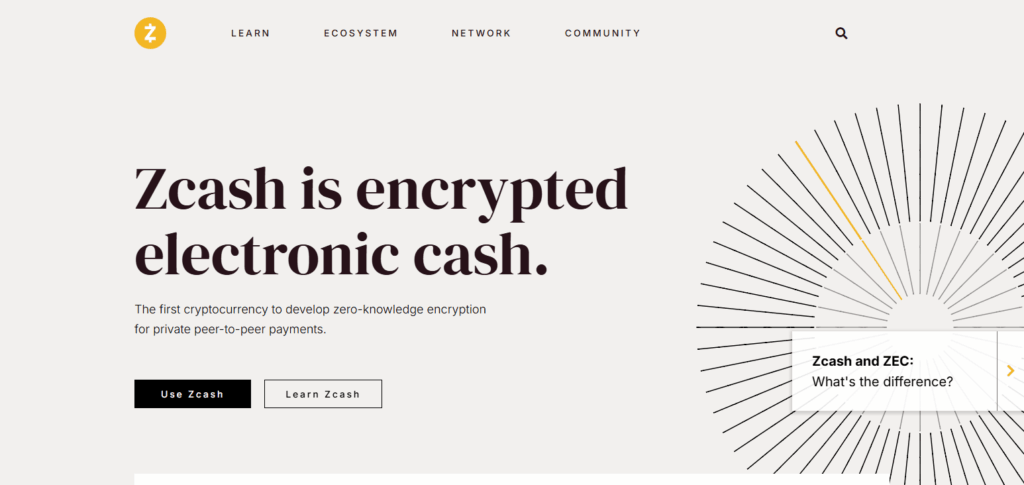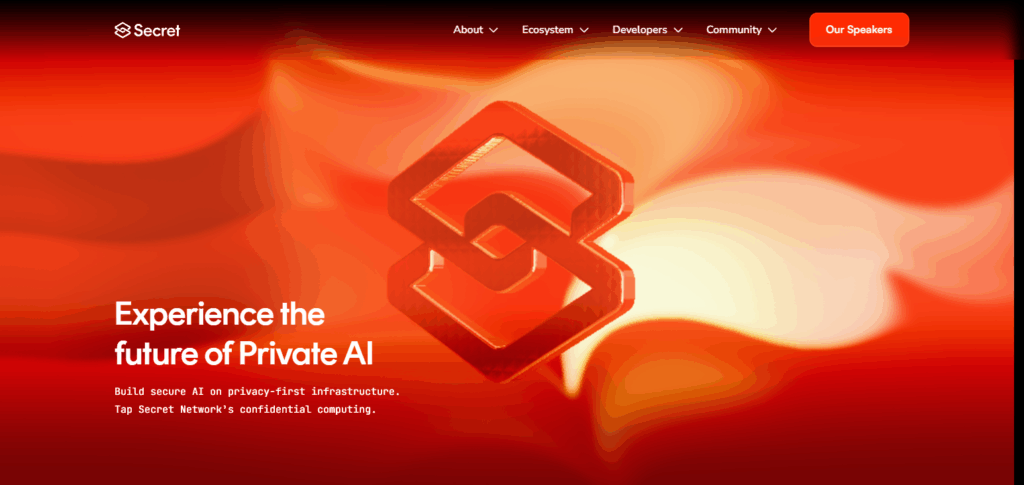In this article, I will cover the Top Privacy-focused Blockchains. Such blockchains focus mainly on user disguise and transaction confidentiality. Advanced cryptographic techniques are employed to safeguard data and financial privacy.
For example, Monero offers default anonymity, and Secret Network features private smart contracts. These blockchains are at the forefront of the battle for privacy in the digital age.
Key Point & Top Privacy-focused Blockchains List
| Cryptocurrency | Key Point |
|---|---|
| Monero (XMR) | Fully anonymous transactions using RingCT and stealth addresses |
| Zcash (ZEC) | Offers optional privacy with advanced zk-SNARKs encryption |
| Firo (FIRO) | Uses Lelantus protocol for full on-chain privacy |
| Secret Network | Enables private smart contracts for Web3 apps |
| Horizen (ZEN) | Scalable privacy platform with sidechain capabilities |
| WorldCoin (WLD) | Fast and private mobile payments integrated with Signal |
| Decred (DCR) | Combines privacy with on-chain governance via CoinShuffle++ |
1.Monero (XMR)
Monero (XMR) remains one of the foremost privacy-centric blockchains, largely due to the fact that it maintains full transaction anonymity by default.

Unlike most other cryptocurrencies, Monero’s sender, receiver, and transaction amount are fully concealed due to the use of sophisticated cryptographic techniques such as Ring Confidential Transactions (RingCT), stealth addresses, and Dandelion++. Monero’s network as a rule favors privacy and fungibility whereby all coins are non distinguishable.
Monero remains the most trusted blockchain for users seeking full financial privacy and confidentiality because of its unyielding privacy stance and lack of optional and partial privacy modes.
| Feature | Details |
|---|---|
| Name | Monero (XMR) |
| Launch Year | 2014 |
| Privacy Technology | RingCT, Stealth Addresses, Dandelion++ |
| Default Privacy | Yes – All transactions are private |
| KYC Requirement | Minimal to None (on decentralized platforms) |
| Main Use Case | Anonymous peer-to-peer transactions |
| Consensus Mechanism | Proof of Work (RandomX) |
| Wallet Support | GUI, CLI, Mobile (Cake Wallet, Monerujo) |
| Notable Feature | All coins are fungible and untraceable |
2.Zcash (ZEC)
Zcash (ZEC) stands out among focused privacy blockchains for its pioneering implementation of zero-knowledge proofs with zk-SNARKs that enable complete encryption and verification of transactions.

What differentiates Zcash with other cryptocurrencies is its user-centered design—leaving the option of choosing between transparent and shielded transactions. This attribute allows Zcash users to control privacy to a large extent.
Such selective disclosure capabilities offer a means of balance between regulatory compliance and the need for anonymity, which makes Zcash unique compared to other cryptocurrencies and serves as a bridge between privacy and mainstream adoption within the blockchain world.
| Feature | Details |
|---|---|
| Name | Zcash (ZEC) |
| Launch Year | 2016 |
| Privacy Technology | zk-SNARKs (Zero-Knowledge Proofs) |
| Privacy Mode | Optional shielded (private) transactions |
| KYC Requirement | Minimal on decentralized exchanges |
| Main Use Case | Selective privacy for secure payments |
| Consensus Mechanism | Proof of Work (Equihash) |
| Wallet Support | Official Zcash wallet, third-party wallets |
| Notable Feature | Users control when to enable privacy features |
3.Firo (FIRO)
Firo (FIRO) is one of the leading privacy-oriented blockchains with the focus of transaction anonymity using the Lelantus protocol.

Firo’s Lelantus protocol stands out because it allows users to burn coins and redeem them later without any transaction links, achieving full privacy on the blockchain. Additionally, Firo also implements Dandelion++ to hide IP addresses of users during broadcasting.
Firo’s strong default privacy and trustless setup are best suited to users needing robust anonymity and decentralization control, which makes Firo one of the strongest players in the privacy coin arena.
| Feature | Details |
|---|---|
| Name | Firo (FIRO) |
| Launch Year | 2016 |
| Privacy Technology | Lelantus protocol, Dandelion++ |
| Default Privacy | Full privacy by default |
| KYC Requirement | Minimal on decentralized platforms |
| Main Use Case | Completely anonymous transactions |
| Consensus Mechanism | Proof of Work (MTP – Merkle Tree Proof) |
| Wallet Support | Official Firo wallet, third-party wallets |
| Notable Feature | Burn-and-redeem mechanism for unlinkable coins |
4.Secret Network
Secret Network remains among the leading privacy-preserving blockchains as it allows encrypted smart contracts (Secret Contracts). Unlike other blockchains where all data is public, Secret Network processes data using Trusted Execution Environments (TEEs) which allows the processing of encrypted data without exposing it to the validators.

This allows the creation of decentralized apps which safeguard sensitive data, including user identity and financial details. Secret Network stands out in the development of secure Web3 as it combines smart contract capabilities with on-chain privacy.
| Feature | Details |
|---|---|
| Name | Secret Network |
| Launch Year | 2020 |
| Privacy Technology | Trusted Execution Environments (TEEs) |
| Privacy Focus | Private smart contracts and data |
| KYC Requirement | Minimal on decentralized platforms |
| Main Use Case | Privacy-preserving decentralized applications |
| Consensus Mechanism | Tendermint Proof of Stake (PoS) |
| Wallet Support | Keplr Wallet, Secret Wallet |
| Notable Feature | Enables encrypted computation on blockchain |
5.Horizen (ZEN)
Horizen (ZEN) has gained recognition as one of the leading blockchains focused on privacy due to its adjustable and scalable privacy infrastructure. Horizen is unique due to its powerful sidechain platform—Zendoo—which enables developers to create their own blockchains, either private or public, with zk-SNARKs privacy features.

This modular design allows for high throughput, secure data processing, and maintained decentralization. Horizen empowers developers and enterprises to create privacy-preserving dApps, enabling dApps far beyond mere anonymous transactions and building a comprehensive privacy-preserving ecosystem.
| Feature | Details |
|---|---|
| Name | Horizen (ZEN) |
| Launch Year | 2017 |
| Privacy Technology | zk-SNARKs, Zendoo sidechain platform |
| Privacy Focus | Scalable privacy and customizable sidechains |
| KYC Requirement | Minimal on decentralized platforms |
| Main Use Case | Privacy-enabled dApps and scalable blockchain |
| Consensus Mechanism | Proof of Work (Equihash) |
| Wallet Support | Official Horizen wallet, third-party wallets |
| Notable Feature | Sidechain architecture for flexible privacy apps |
6.WorldCoin (WLD)
Worldcoin (WLD) is positioned as one of the leading privacy-centric blockchains by implementing proof of personhood via biometric ID with the Orb device. Its privacy concern can be described as controversial, but it attempts to separate identity from wallet activity by using zero-knowledge proofs.

This allows the system to verify users’ uniqueness without revealing private information. Worldcoin seeks to enable digital identities and financial services while maintaining privacy. Their distinct approach of combining biometric identification with blockchain technology places them in the intersection of privacy and security.
| Feature | Details |
|---|---|
| Name | Worldcoin (WLD) |
| Launch Year | 2021 |
| Privacy Technology | Zero-Knowledge Proofs, Biometric Proof of Personhood |
| Privacy Focus | Decentralized identity with privacy-preserving verification |
| KYC Requirement | Minimal, uses biometric verification without storing personal data |
| Main Use Case | Global digital identity and private financial access |
| Consensus Mechanism | Proof of Stake |
| Wallet Support | Integrated with native Worldcoin wallets |
| Notable Feature | Combines biometric identity with zero-knowledge proofs for privacy |
7.Decred (DCR)
Decred (DCR) is one of the leading blockchain systems focused on privacy. From the very beginning of the project, it had a peculiar feature, namely, a built-in governance system which is complemented with privacy features.

An on-chain mixing features allows the users to anonymously do their transactions with the help of a service called CoinShuffle++. Decred is known, and in fact, somewhat unique, for its hybrid consensus model which incorporates a blend of Proof of Work and Proof of Stake, allowing the community to make decisions.
Decred is one of the few cryptocurrencies which brilliantly combines transparent governance and optional privacy. It provides robust privacy and an empowering ecosystem for the users.
| Feature | Details |
|---|---|
| Name | Decred (DCR) |
| Launch Year | 2016 |
| Privacy Technology | CoinShuffle++ mixing protocol |
| Privacy Focus | Optional on-chain transaction privacy |
| KYC Requirement | Minimal on decentralized platforms |
| Main Use Case | Decentralized governance with privacy options |
| Consensus Mechanism | Hybrid Proof of Work + Proof of Stake |
| Wallet Support | Official Decred wallet, third-party wallets |
| Notable Feature | Combines privacy with community-driven governance |
Conclusion
As shared above the leading Monero, Zcash, Firo, Secret Network, Horizen, MobileCoin, and Decred blockchains have different techniques for protecting privacy, providing specific innovations for each method. While some offer selective anonymity, others offer private smart contracts.
The growing concentration of these measures depicts the need for privacy and censorship-resistance. The warning provided includes encryption techniques such as RingCT to zk-SNARKs and TEEs depicted in greater detail the advancing need for these blockchains, thus offering personal protection and freedom. These blockchains are crucial for the undercover safety of life in the decentralized world.
FAQ
What are privacy-focused blockchains?
Privacy-focused blockchains prioritize user anonymity and transaction confidentiality by hiding sender, receiver, and transaction amounts.
Which are some leading privacy-focused blockchains?
Monero (XMR), Zcash (ZEC), Firo (FIRO), Secret Network, Horizen (ZEN), MobileCoin (MOB), and Decred (DCR) are well-known examples.
How do privacy technologies differ among these blockchains?
Technologies vary: Monero uses RingCT and stealth addresses; Zcash uses zk-SNARKs; Firo employs Lelantus; Secret Network uses Trusted Execution Environments (TEEs).









